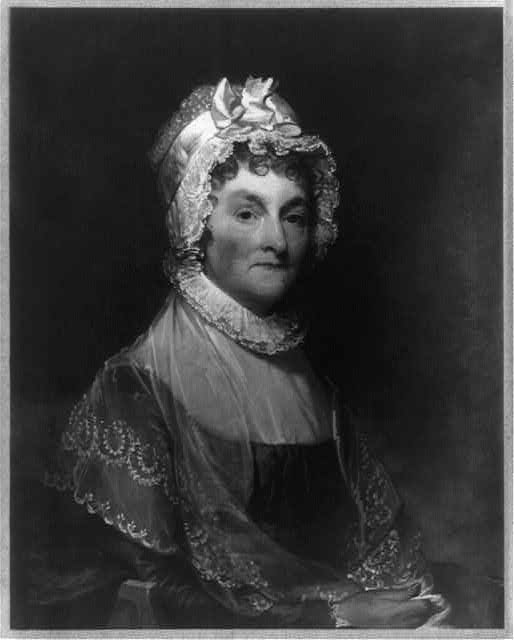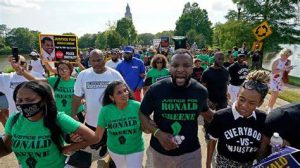Too often in society women are belittled because of their gender, despite their numerous abilities and achievements. Women all over the world fall victims, and struggle to become survivors, of inequality against their male counterparts. Although some improvements have been made over time, there is still much progress to be done in order to establish an equality between men and women in all aspects of life, not just in a few token areas. During the eighteenth century, a few women became advocates for women’s rights and fought for individual freedoms that were attainable for men but rarely for women. One of these advocates was Abigail Adams, first lady to the second President, John Adams. Abigail, a devout wife and American citizen, was more than just a first lady to the president. She was an early feminist voice who refused to stand by and allow women to be suppressed of their capabilities and their rights.
In order to comprehend why Abigail felt so strongly and fought so vigorously for her beliefs, it is important first to understand how her beliefs became rooted. Abigail was the second out of four children from William Smith and Elizabeth Quincy. Her father was a minister of North Parish Congregational Church of Weymouth in Massachusetts colony; her mother Elizabeth was a typical housewife and mother. Abigail was fortunate enough to be born into such an eminent family in New England with a prosperous lineage of statesman, ministers, and merchants. She was raised in a household that wholeheartedly affirmed the beliefs of rational Puritanism, a solid Christian faith, and a strong education.1

From an early age, Abigail was introduced to the limitations of women by being unable to attend school. Growing up in the eighteenth century, education was highly sought after; however, education was primarily for boys, not girls. Boys had the opportunity to study various subjects, such as Latin, math, French, literature, and Greek. Elite families often prepared their boys to receive a higher education, either at Harvard College or abroad. Since girls were not permitted to attend school, Abigail was educated at home. Though her education did include some rudimentary training in academic areas such as reading and writing, most of her education focused on becoming a traditional housewife and mother. She observed her mother in common domestic skills such as sewing, cooking, and home maintenance.2
Her most significant influence occurred around the time of the Revolutionary War, which was a time of extreme stress and chaos for the young republic. This was a time when participation of every American became absolutely imperative in order to win not only the war, but also to restructure the country afterwards. Despite the circumstances, the social conditions for women went largely unchanged. During the Revolutionary War, while many of the men were away serving the war effort, the women were left in charge of the businesses and farms. The towns and cities were left with impoverished women who were often driven to lead protests and riots against price increases, as well as resorting to looting for food. In other parts of the country, women began to fight back against British troops, whom they were forced to quarter during the war. Some women either by choice, force, or desperation, traveled to the Patriot army camps to live with their male relatives.3
After the women began migrating to the camps, many men became hostile and voiced brutal complaints against the women. One man even expressed a barbarous comment about women, claiming “their falling, their brows beady with the heat, their belongings, slung over one shoulder, chattering and yelling in sluttish shrills as they went.”4 George Washington himself even believed the females to be disruptive and a distraction to the troops. In reality, women were actually a great asset and made major contributions towards the war effort. Most women performed domestic duties such as cooking, laundry, nursing, and even boosting the morale of the soldiers. Some women went beyond the normal expectations and became involved in the combat.5
By the end of the war, the views and standards of women had remained the same as at the outset. Many women began to question their place in society, including Abigail Adams. As early as March 31, 1776, while her husband was in Philadelphia forming a new government, Abigail wrote a letter to her husband, John, imploring him to expand women’s rights to become equal with the rights of men:
I long to hear that you have declared an independancy—and by the way in the new Code of Laws which I suppose it will be necessary for you to make I desire you would Remember the Ladies, and be more generous and favourable to them than your ancestors. Do not put such unlimited power into the hands of the Husbands. Remember all Men would be tyrants if they could. If perticuliar care and attention is not paid to the Laidies we are determined to foment a Rebelion, and will not hold ourselves bound by any Laws in which we have no voice, or Representation.6
Abigail was making her purpose clear and made sure it was known that women would no longer stand for unfair and unjust treatment.

Abigail continued to fight for the rights of women for the rest of her life. Although she was most known for her strong tone in her letters, she was also a major advocate for the right of education for women. Abigail became one of the most literate and politically-powerful women of her time.7 Her ideals, courage to voice her intellectual opinions, and ability to stand up for her beliefs is what established the main attraction between her and John. Abigail was able to maintain the perfect image of the domestic housewife, mother, and First Lady to the President of the United States. Abigail tread a path for women which is still being followed today. Hopefully her beliefs and visions for the equality of women will one day come true.
- Salem Press Biographical Encyclopedia, 2016, s.v. “Abigail Adams” by Mary E. Virginia. ↵
- Salem Press Biographical Encyclopedia, 2016, s.v. “Abigail Adams” by Mary E. Virginia. ↵
- Alan Brinkley, American History: Connecting with the Past Volume 1, 15 edition (New York: McGraw-Hill Education, 2015), 147. ↵
- Brinkley, American History: Connecting with the Past, 147. ↵
- Brinkley, American History: Connecting with the Past, 147. ↵
- Abigail Adams, “Abigail Adams’ Letters to John Adams March 31, 1776,” Adams Family Papers: An Electronic Archive. Massachusetts Historical Society. http://www.masshist.org/digitaladams/. ↵
- Salem Press Biographical Encyclopedia, 2016, s.v. “Abigail Adams” by Mary E. Virginia. ↵



85 comments
Tomas Salazar
I have very little amount of the knowledge of the Adams couple, Abigail had a great influence on her husband. She was extremely intelligent, especially in those times back then. This article did a fantastic job at going into great detail about how much Abigail Adams was a wonderful person. The fact that Abigail had the ability to sustain the perfect housewife image and also voicing her opinions show how she really wanted to fight for change for women.
Trenton Boudreaux
A well written and researched article. It’s a shame that such harmful ideas such as patriarchy are still around in certain forms. I suppose that it could be blamed on the over a thousand-year history of the practice, but its good to see that even in the 1700s, people like Abigail Adams were beginning to fight against the ancient practice.
Carlos Hinojosa
The article although short got it’s point across and highlighted key things Mrs. Adams did as both the wife of a politician and the Second Lady. I enjoyed the article because a lot of people forget about her when they talk about important female figures in history. So, this was a nice change of pace.
Maria Luevano
This article is a great read for anyone who wants to expand their knowledge of famous feminists. I certainly did not know much about Abigail Adams and am glad I read this. This is a very well-written article and kept it light-hearted and interesting, you did a great job, Mia! I’m glad women had someone like Adams to fight for their right to education and a life outside the domestic duties assigned to women during this time period.
Faizah Ijaz
After reading this article, I found it interesting that this is something women have struggled throughout history and there were women even back in history who fought for our rights. I think her background of a strong education and household really made her who she was to fight for the rights of women and hold and speak on feminist values.
Mariah Podwika
I enjoyed reading this article! It is often rare to see an article truly focus on a woman in history. Our attention is normally drawn to the big and flashy points of history that normally contain men at the center, but it’s always great to see how far women were willing to go to get their rights. With things going how they are going in America now, specifically in Texas, it is interesting to see how the issues we are struggling with now and the ones they were dealing with back then are different but yet similar. Abigail Adams was a pioneer of women’s advocacy, and I hope that we can attain the image of equality that she once held one day.
Aidan Farrell
This is a very well done passage, Mia. Abigail Adams was a very important figure in women’s rights, and I feel like your passage did a very good job in helping tell people about this very important women and her accomplishments in helping women’s rights. Your grammar and word choice is well thought out, and everything is laid out really well. Well done, Mia.
Elliot Avigael
I never knew much about Abigail Adams, other than she was the wife of John Adams. I would be curious to know as to whether or not her husband heeded her advice and advocated on her behalf during the drafting of the Constitution in Philadelphia. I found your point of how it took everyone to win the war very interesting; not only were men required to be on the frontlines to push back the British, but the women were needed to keep the men level-headed, fed, and behaved. Even if their presence on the frontlines wasn’t appreciated by their husbands, it’s amazing to think that colonial women were dedicated to the cause for independence just as much as the men were. No great victory or war has ever been secured without the very much needed assistance of women, even if that didn’t necessarily mean they were fighting on the battlefield.
Phylisha Liscano
Hello Mia, I enjoyed reading your article. It was very informative and provided a tremendous amount of facts. It’s hard being a woman in a mans world but I am so very grateful that we have women like Abigail Adams to stand up for women’s rights. The images allowed me to take a look at how things were and to get a visual of Abigail Adams. Very well written article and taking a look at your citations I can see you did lots of research.
Seth Roen
Behind every great man, there is always a great woman who properly deserves some spotlight, too, move buddy—all seriousness aside, very informative on one of the many unsung heroes of the Revolutionary war. It is amazing how much women do play in the conflict. In a small war, tactics are the best way to describe them. It is a shame that it took centuries before women started to be part of history books for their deeds.